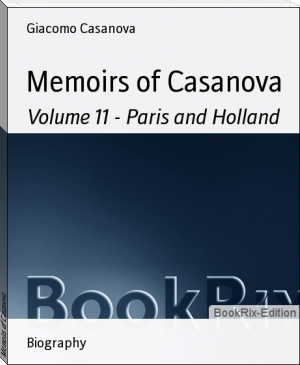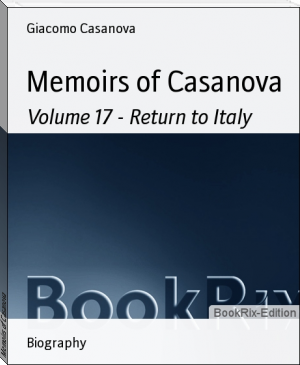The Complete Memoirs of Jacques Casanova de Seingalt by Giacomo Casanova (list of e readers .txt) 📕

- Author: Giacomo Casanova
- Performer: -
Book online «The Complete Memoirs of Jacques Casanova de Seingalt by Giacomo Casanova (list of e readers .txt) 📕». Author Giacomo Casanova
"Your very humble servant, "[Marianne Charpillon] "Wednesday at six o'clock"
On the 8th April, 1790, Zaguri wrote in reference to vertigo of which Casanova complained: "Have you tried riding horseback? Do you not think that is an excellent preservative? I tried it this last summer and I find myself very well"
In 1790, Casanova had a conversation with the Emperor Joseph II at Luxemburg, on the subject of purchased nobility, which he reports in the Memoirs.
This same year, attending the coronation of Leopold at Prague, Casanova met his grandson (and, probably, as he himself believed, his own son), the son of Leonilda, who was the daughter of Casanova and Donna Lucrezia, and who was married to the Marquis C . . . . In 1792, Leonilda wrote, inviting Casanova to "spend the remainder of my days with her."
In February 1791, Casanova wrote to Countess Lamberg: "I have in my capitularies more than four hundred sentences which pass for aphorisms and which include all the tricks which place one word for another. One can read in Livy that Hannibal overcame the Alps by means of vinegar. No elephant ever uttered such a stupidity. Livy? Not at all. Livy was not a beast; it is you who are, foolish instructor of credulous youth! Livy did not say aceto which means vinegar, but aceta which means axe"
In April 1791, Casanova wrote to Carlo Grimani at Venice, stating that he felt he had committed a great fault in publishing his libel, 'Ne amori ne donne', and very humbly begging his pardon. Also that his Memoirs would be composed of six volumes in octavo with a seventh supplementary volume containing codicils.
In June, Casanova composed for the theater of Princess Clari, at Teplitz, a piece entitled: 'Le Polemoscope ou la Calomnie demasquee par la presence d'esprit, tragicomedie en trois actes'. The manuscript was preserved at Dux, together with another form of the same, having the sub- title of 'La Lorgnette Menteuse ou la Calomnie demasquee'. It may be assumed that the staging of this piece was an occasion of pleasant activity for Casanova.
In January 1792, during Count Waldstein's absence in London or Paris, Casanova was embroiled with M. Faulkircher, maitre d'hotel, over the unpleasant matter indicated in two of Casanova's letters to this functionary:
"Your rascally Vidierol . . . tore my portrait out of one of my books, scrawled my name on it, with the epithet which you taught him and then stuck it on the door of the privy ....
"Determined to make sure of the punishment of your infamous valet, and wishing at the same time to give proof of my respect for Count Waldstein, not forgetting that, as a last resort, I have the right to invade his jurisdiction, I took an advocate, wrote my complaint and had it translated into German . . . . Having heard of this at Teplitz, and having known that I would not save your name, you came to my chamber to beg me to write whatever I wished but not to name you because it would place you wrong before the War Council and expose you to the loss of your pension . . . . I have torn up my first complaint and have written a second in Latin, which an advocate of Bilin has translated for me and which I have deposited at the office of the judiciary at Dux...."
Following this matter, Casanova attended the Carnival at Oberleutensdorf, and left at Dux a manuscript headed 'Passe temps de Jacques Casanova de Seingalt pour le carnaval de l'an 1792 dans le bourg d'Oberleutensdorf'. While in that city, meditating on the Faulkircher incident, he wrote also 'Les quinze pardons, monologue nocturne du bibliothecaire', also preserved in manuscript at Dux, in which we read:
"Gerron, having served twenty years as a simple soldier, acquired a great knowledge of military discipline. This man was not yet seventy years old. He had come to believe, partly from practice, partly from theory, that twenty blows with a baton on the rump are not dishonoring. When the honest soldier was unfortunate enough to deserve them, he accepted them with resignation. The pain was sharp, but not lasting; it did not deprive him of either appetite nor honor . . . . Gerron, becoming a corporal, had obtained no idea of any kind of sorrow other than that coming from the blows of a baton on the rump . . . . On this idea, he thought that the soul of an honest man was no different than a soldier's breech. If Gerron caused trouble to the spirit of a man of honor, he thought that this spirit, like his own, had only a rump, and that any trouble he caused would pass likewise. He deceived himself. The breech of the spirit of an honest man is different than the breech of the spirit of a Gerron who rendered compatible the rank of a military officer with the vile employments of a domestic and the stable-master of some particular lord. Since Gerron deceived himself, we must pardon him all his faults . . ." etc.
Casanova complained of the Faulkircher incident to the mother of Count Waldstein, who wrote: "I pity you, Monsieur, for being obliged to live among such people and in such evil company, but my son will not forget that which he owes to himself and I am sure he will give you all the satisfaction you wish." Also to his friend Zaguri, who wrote, the 16th March: "I hope that the gout in your hand will not torment you any more . . . You have told me the story I asked about and which begins: 'Two months have passed since an officer, who is at Vienna, insulted me!' I cannot understand whether he who wrote you an insulting letter is at Vienna or whether he is at Dux. When will the Count return?.... You should await his return because you would have, among other reasons to present to him, that of not wishing to have recourse to other jurisdiction than his.... You say your letters have been intercepted? Someone has put your portrait in the privy? The devil! It is a miracle that you have not killed someone. Positively, I am curious to know the results and I hope that you make no mistakes in this affair which appears to me very delicate."
In August 1792, or thereabouts, Da Ponte on his way to Dresden, visited Casanova at Dux, in the hope of collecting an old debt, but gave up this hope on realizing Casanova's limited resources. In the winter of 1792-3 Da Ponte found himself in great distress in Holland. "Casanova was the only man to whom I could apply," he writes in his Memoirs. "To better dispose him, I thought to write him in verse, depicting my troubles and begging him to send me some money on account of that which he still owed me. Far from considering my request, he contented himself with replying, in vulgar prose, by a laconic billet which I transcribe: 'When Cicero wrote to his friends, he avoided telling them of his affairs.'"
In May 1793, Da Ponte wrote from London: "Count Waldstein has lived a very obscure life in London, badly lodged, badly dressed, badly served, always in cabarets, cafes, with porters, with rascals, with . . . we will leave out the rest. He has the heart of an angel and an excellent character, but not so good a head as ours."
Toward the end of 1792, Cssanova wrote a letter to Robespierre, which, as he advises M. Opiz, the 13th January 1793, occupied one hundred and twenty folio pages. This letter was not to be found at Dux and it may possibly have been sent, or may have been destroyed by Casanova on the advice of Abbe O'Kelly. Casanova's feelings were very bitter over the trial of Louis XVI., and in his letters to M. Opiz he complained bitterly of the Jacobins and predicted the ruin of France. Certainly, to Casanova, the French Revolution represented the complete overthrow of many of his cherished illusions.
On the 1st August 1793, Wilhelmina Rietz, Countess Lichtenau (called the Pompadour of Frederic-William II., King of Prussia) wrote to the librarian at Dux:
"Monsieur
"It seems impossible to know where Count Valstaine [Waldstein] is staying, whether he is in Europe, Africa, America, or possibly the Megamiques. If he is there, you are the only one who could insure his receiving the enclosed letter.
"For my part, I have not yet had time to read their history, but the first reading I do will assuredly be that.
"Mademoiselle Chappuis has the honor of recalling herself to your memory, and I have that of being your very humble servant,
"Wilhelmina Rietz."
The allusions to a "history" and to the 'Megamiques' in this letter refer to Casanova's romance, 'Icosameron'.
About this time, Count Waldstein returned to Dux after having been, at Paris, according to Da Ponte, concerned in planning the flight of Louis XVI., and in attempting to save the Princess Lamballe. On the 17th August, Casanova replied to the above letter:
"Madame,
"I handed the Count your letter two minutes after having received it, finding him easily. I told him that he should respond at once, for the post was ready to go; but, as he begged to wait for the following ordinary, I did not insist. The day before yesterday, he begged me to wait again, but he did not find me so complaisant. I respond to you, Madame, for his carelessness in replying to letters is extreme; he is so shameful that he is in despair when he is obliged to it. Although he may not respond, be sure of seeing him at your house at Berlin after the Leipzig Fair, with a hundred bad excuses which you will laugh at and pretend to believe good ones . . . . This last month, my wish to see Berlin again has become immeasurable, and I will do my best to have Count Waldstein take me there in the month of October or at least to permit me to go . . . . You have given me an idea of Berlin far different than that the city left with me when I passed four months there twenty-nine years ago . . . . If my 'Icosameron' interests you, I offer you its Spirit. I wrote it here two years ago and I would not have published it if I had not dared hope that the Theological Censor would permit it. At Berlin no one raised the least difficulty . . . . If circumstances do not permit me to pay you my respects at Berlin, I hope for the happiness of seeing you here next year . . . ."
Sometime after this and following





Comments (0)